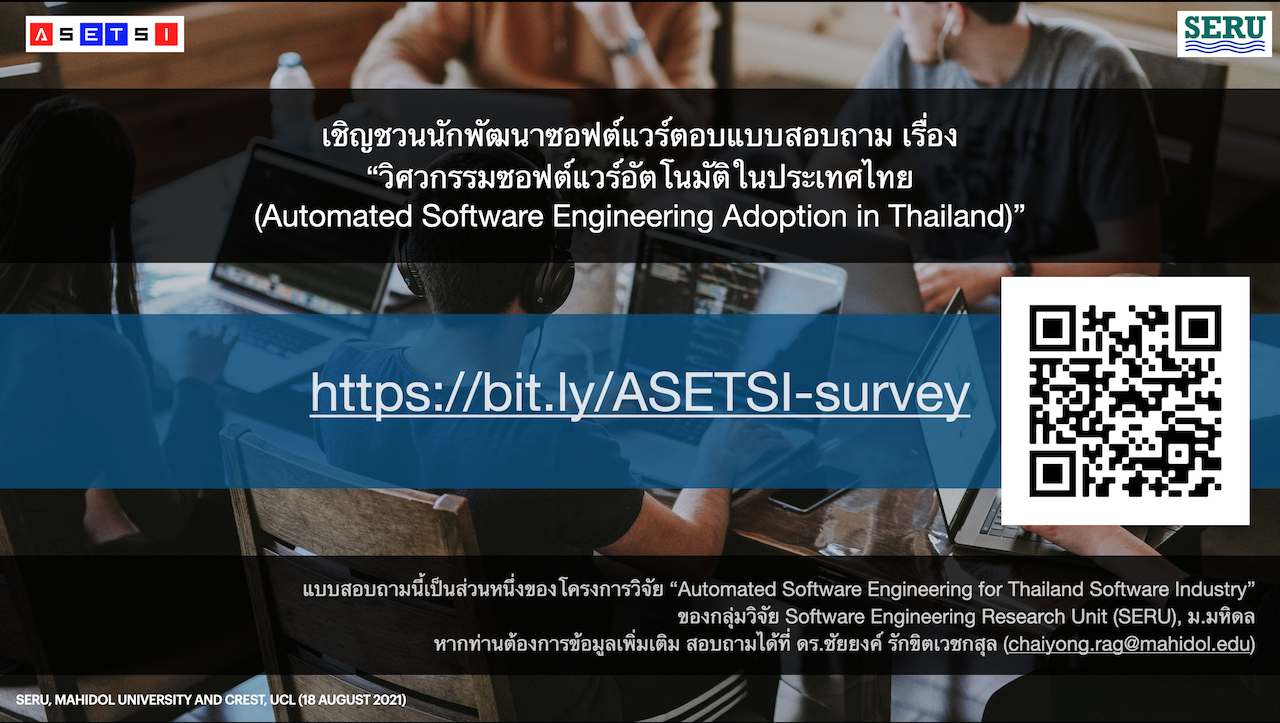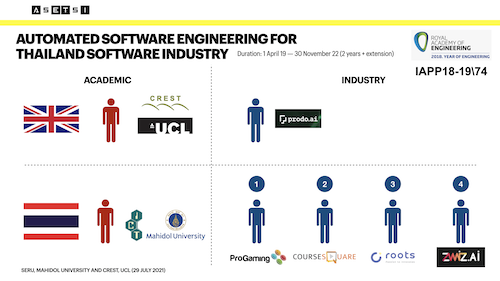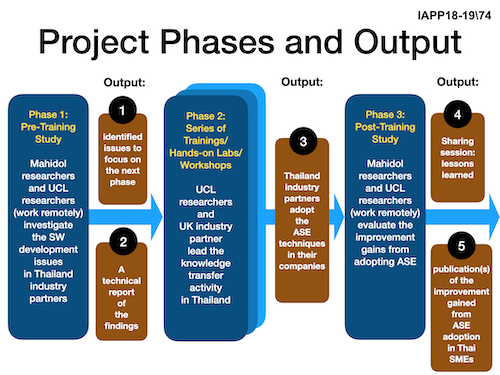ASETSI
Website of the Automated Software Engineering for Thailand Software Industry (ASETSI) project.
Automated Software Engineering for Thailand Software Industry (ASETSI)
Industry Academia Partnership Programme (IAPP 18/19) - IAPP18-19/74.
| Menu: HOME | STUDIES & PUBLICATIONS | NEWS & UPDATES |
Online Survey

ขอเชิญชวนนักพัฒนาซอฟต์แวร์ (programmer, tester, project manager, etc.) ช่วยตอบแบบสอบถามเรื่อง “วิศวกรรมซอฟต์แวร์อัตโนมัติในประเทศไทย” เพื่อศึกษาถึงความรู้ ความเข้าใจ และปัญหาจากการใช้งาน (หรือการจะนำมาใช้งาน) ของวิศวกรรมซอฟต์แวร์อัตโนมัติให้มากขึ้น
The research team invites all software-related personels (programmers, testers, project managers, etc.) participate in the online survey “Automated Software Engineering Adoption in Thailand” to study the knowledge, awareness, and challenges from adoption (or plan to adopt) of automated software engineering in Thailand.
Survey Link: https://forms.gle/Fhp4pptCLV44fawbA
News & Updates
- 13-Nov-2022: The findings from this project was presented at the Dev Mountain Tech Festival 2 in Chiang Mai. See the video recording of the presentation (in Thai) here.
- 22-Jun-2022: We have organized a sharing lessons learned session by having the four industry partners joining a panel discussion and sharing their challenges and experiences on adopting automated software engineering tools. See more info in the news page.
- 16-Jun-2022: We have the 2nd workshop “Now You See Me: Understanding your software using SonarQube static code analysis tool”. See more info in the news page.
- 17-Dec-2021: The first phase of the study titled “Identifying Software Engineering Challenges in Software SMEs: A Case Study in Thailand” has been published in the Industry Track of the 29th International Conference on Software Analysis, Evolution, and Reengineering (SANER’22)! See more info in the publications page.
- See more news & updates » here «.
Problem Statement
This Thai-UK collaboration aims to improve the quality of software development processes and products in Thailand’s software industry by transferring the knowledge of state-of-the-art automated software engineering (ASE) tools and techniques from the UK experts.
Overview of the Project

Download the slides explaining the project: » here «.
The software industry has become an integral part of Thailand’s competitiveness and the country’s future development plan (Thailand 4.0 and the 20-year roadmap). The current state-of-the-art in software engineering (i.e., the application of engineering approaches to software development and its artefacts) is automated software engineering (ASE), which is an adoption of automated tools and techniques to help human programmers plan, develop, and maintain software. Nonetheless, ASE is still a relatively new concept in Thailand software industry.
ASE covers every process in software development. From requirement and coding perspectives, ASE techniques assist the programmers in requirement traceability, checking coding styles and predicting potentially defective code. From a tester’s perspective, ASE helps in performing tests faster and more efficiently. From a deployment perspective, ASE accelerates the speed in deploying the software into production by using continuous integration and deployment. World-leading software companies (e.g., Microsoft, Google, Facebook) are using such ASE tools and techniques exhaustively during their product development. However, it is unknown if this practice has been adopted successfully in software development SMEs, especially in Thailand. Thus, by studying the challenges Thai software development SMEs currently face and train them to adopt ASE to tackle such challenges, the quality and quantity of software products developed in Thailand will be tremendously increased.
This project provides benefits to both the UK and the Thai partners. First, it provides knowledge transfer of ASE expertise from the UK to improve the capabilities of Thailand software companies. Second, the project enables the UK researchers to study the productivity gain through applying ASE techniques into SMEs. The project will include a series of training/hands-on workshop sessions held in Thailand on topics surrounding ASE with the trainers/facilitators from both the UK and Thai partners. This project is an important milestone to establish further UK-Thailand software engineering research collaboration.
Project Duration
2 May 2019 - 30 November 2022 (extended)
Team
- Chaiyong Ragkhitwetsagul, Lecturer, Mahidol University, Thailand (Co-PI Thailand)
- Morakot Choetkiertikul, Lecturer, Mahidol University, Thailand
- Thanwadee Sunetnanta, Assistant Professor, Mahidol University, Thailand
- Jens Krinke, Associate Professor, University College London, UK (Co-PI UK)
- Federica Sarro, Professor, University College London, UK
- Prodo.AI (UK Industry Partner)
- ProGaming (Thai Industry Partner)
- CourseSquare (Thai Industry Partner)
- Trinity Roots (Thai Industry Partner)
- Robolingo (Zwiz.AI) (Thai Industry Partner)
Goals and Objectives
- The project aims to investigate the challenges in software engineering that specifically occur in Asian culture, especially in Thailand, and how effective ASE tackles such challenges. Due to the different working cultures, this collaboration will reveal new insights into Thai (and possibly Asian) software SMEs. This study cannot be performed in the UK due to its relatively advanced software engineering knowledge in industry.
- After identifying the challenges, the project aims to transfer advanced ASE knowledge in software engineering from the UK experts to practitioners in Thailand’s software industry in order to tackle such challenges and to improve the quality of software development in Thailand.
- The project aims to establish a long-term collaboration between the UK university (UCL) and Thai University (Mahidol) so both parties will work together to solve future industry-inspired research topics, especially from the software companies in Thailand.
Expected Outcomes
There are two sets of expected outcomes of the project: (1) the research findings of challenges in software SMEs in Thailand and the improvements after applying ASE techniques, and (2) the increased knowledge of ASE in Thailand software industry through trainings/hands-on labs/workshops.
The research findings are valuable for the software engineering research community. We plan to publish the findings to academic conferences and journals. Moreover, we will use them as a case study to teach the software engineering students at Mahidol University.
The increased knowledge of ASE in Thailand software industry may not have an immediate impact but surely will show its value in the long run. Within the scope of this project, we plan to follow up the improvement in the company’s software development process and products within a few months after the Thai industry partners learn the ASE techniques and apply them in their companies. We also look forward to perform a longer follow up study after they have been using ASE for a longer period, in the second year.
Moreover, this project plans to organise a sharing lesson, at the end of the project period, to disseminate the knowledge and lessons learned on adopting ASE techniques from the four industry partners. Thus, this sharing lesson will create an impact to a wider Thai software engineering community by raising an awareness of ASE in Thailand.
Activities Undertaken

The programme of work to be performed during the project is separated into three phases : (1) a pre-training study of the challenges in software development in Thailand, (2) a series of trainings/hands-on labs/workshops about advanced ASE tools and techniques, (3) a post-training study of the improvements in software process and products after adopting ASE. The detail of each phase is explained below.
Phase 1: A pre-training study of the challenges in software development in Thailand (to answer Objective 1 and 3).
This phase investigates the current practices being used in their day-to-day software development routines in the Thai industry partners (software SMEs) and identifies the challenges they are facing in terms of costs, time, and software quality. The required tasks include performing a survey of the company’s programmers, an observation of the company’s software development activities, and analyses of the software products. The tasks will occur in Thailand and will be performed locally by a team of Mahidol researchers, and remotely by UCL researchers. The findings from this phase will be used to set the focus of the knowledge transfer in Phase 2. The deliverable of this phase is a technical report.
Phase 2: A series of trainings/hands-on labs/workshops for transferring the advanced ASE knowledge from the UK experts to Thai industry partners (to answer Objective 2).
This phase aims to equip the Thai project managers and programmers with ASE tools and techniques. The required tasks include three sets of a combination of training (class-based format with speakers from the UK academic and industry partners), hands-on labs (doing exercises on a computer), and a workshop (in a seminar-based format which stirs discussion and exchange of ideas. These tasks will occur in Thailand and will be jointly performed by the UK and the Thai researchers. At the end of the last training activity, the Thai industry partners will choose to adopt some of the ASE techniques discussed during the trainings/hands-on labs/workshosp into their companies. The deliverables of this phase is a report summarising the activities and the evaluation from the attendees.
Phase 3: A post-training study on the improvement in the software development process or products (to answer Objective 1 and 3).
This phase empirically evaluates the effectiveness of the knowledge transfer activities.
The required tasks include performing another survey of the company’s programmers, an observation of the company’s software development activities, and analysese of the same software products to quantitatively measure the improvements (e.g., time to deliver new versions, amount of duplicated code, number of bugs reported/fixed). The tasks will occur in Thailand and will be performed locally by a team of Mahidol researchers, and remotely by UCL researchers. The findings from this phase will be used to set the goals and objectives for the future collaborations. The deliverable of this phase is a technical report or an academic publication. Moreover, at the end of this phase, we will organise a seminar for the four Thai industry partners to share their lessons learned to participants from Thailand software industry to upscale the impact of the project and increase the awareness of ASE in Thailand.
By completing the three phases above, we answer the three objectives of the project by performing a systematic study of identifying gaps in Thai software development and the effects of applying ASE into the development process. We believe the knowledge transfer that will occur in this project will be valuable for the Thai industry partners in the long run. At the same time, the project also generates novel knowledge in the software engineering research area by studying the improvements gained from applying ASE to software SMEs.